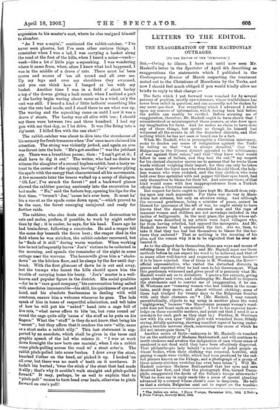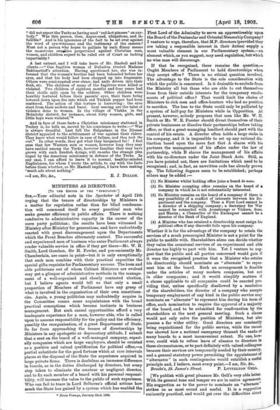LETTERS TO THE EDITOR.
THE EXAGGERATION OF THE MACEDONIAN OUTRAGES.
[TO TER EDITOR OF THE "SPECTATOR."]
SIR,—Owing to illness, I have not until now seen Mr. liaskell's letter in the Spectator of April 4th describing as exaggerations the statements which I published in the Contemporary Review of March respecting the treatment meted out to the Christians of Macedonia by the Turks, and now I should feel much obliged if you would kindly allow me briefly to reply to that charge :— The facts which I put forward were vouched for by several persons of position, mostly eye-witnesses, whose truthfulness bas never been called in question, and can assuredly not be shaken by any mere ipse.dizit. For everything which I advanced I relied upon my sources of information, which having been laid before the public can readily be verified. Before accusing me of exaggeration, therefore, Mr. Haskell ought to have shown that I misunderstood or misinterpreted those sources, or else drew upon my imagination for facts. And he makes no claim to have done any of these things but speaks as though he himself had. witnessed all the events in all the disturbed districts, and that nothing which he has not seen or heard can be a fact.
When Mr. Haskell, who is presumably a Christian missionary, seeks to deaden our sense of indignation against the Turks by telling us that "war is always dreadful," that "the Bulgarians in the Djuanai district appealed to the arbitrameat of war against their rulers," and that "they knew what would follow in case of failure, and they took the risk," my respect for his clerical character moves me to assume that he wrote those words without weighing their import, for they can only be taken to mean that the loyal men who were killed in cold blood, the help- less women who were violated, and the tiny children who were held over fires sprinkled with red pepper till their eyes burst; had only themselves to blame for their lot. And extreme views of that kind -would come with less inappropriateness from a Turkish official than a Christian missionary.
But respect for facts ought to have kept Mr. Haskell from rely.. lug upon any such argument. For there was no war in Mace- donia last autumn, but only an abortive rising. And although the reverend gentleman, being a minister of peace, cannot be blamed for ignorance of the art of war, he ought surely to have known that the slaughter of unarmed men and the rape of innocent women and children are not nowadays included in the tactics of belligerents. In the next place, the people whose suf- ferings were described in my article were loyal villagers who, far from having rebelled, had opposed the insurgents. And Mr. Haskell knows that I emphasised the fact. Are we, then, to take it that they too had but themselves to blame for the tor- tures they endured? That or nothing is the meaning of his plea, and the reason why it is to be regretted that he ever ad- vanced it.
As to the alleged facts themselves, there are ways and means of refuting them if they be false ; and Mr. Haskell must use those methods before he can expect his word to be believed, and that of so many other well-known and respected persons whose business it is to know rejected. One of these is M. Westman, the Bassin,. official representative, who visited the disturbed districts in" person and reported what he had seen to his Government. What this gentleman witnessed and gives proof of is precisely what Mr. Haskell would ask us to disbelieve. I quote a few extracts, giving again chapter and verse, and challenging Mr. Haskell to disprove the statements and to convict me of exaggeration, if he can. M. Westman saw "runaway women who had hidden in the moun- tains, amid deep snows, and almost without clothing; some of them had trudged for twenty days to the Bulgarian frontier with only their chemises on." t (Mr. Haskell, I may remark parenthetically, objects to my using in another place the word "nightgowns," because "the Macedonian peasant woman's ward- robe does not boast such an article." I bow to his superior know- ledge on these recondite matters, and point out that I used it as a synonym for such garb as they slept in.) Further, M. Westman saw with his own eyes "little girls with wrenched faces, fitfully crying, fitfully quivering, showing manifest signs of having under- gone a terrible nervous shock, concerning the cause of which he did not interrogate them.": Another series of facts—unknown to Mr. Haskell—is vouched for on the authority of Madame Bakhmetieff, and will continue to merit credence and awaken the indignation of men whose sense of manhood is not dead until they have been effectively disproved. That philanthropic lady beheld "a number of jaded people' on whose bodies, when their clothing was removed, horrible, still gaping wounds were visible, which had been produced by the red- hot pincers known as the Falaga ; and a photograph of a group of these misery-stricken wretches has even been taken." § Will Mr. Haskell convince Madame Bakhmetieff that her eyes and ears deceived her first, and that the photograph film, turned Turco- phile, exaggerated the deeds of the Sultan's troops afterwards ? What he does say in reply reads like a piece of special pleading advanced by a counsel whose client's case is desperate. He tells us that a certain Bulgarian sent out to report on the troubles The Ranee are mine. 1. Moroi 'Fromm November 20th, 1902. XThiden5 Nero. Vremya, January 22nd, 1903. "did not report the Turks as having used red-hot pincers' on any- body." Was this person, then, Argus-eyed, ubiquitous, and in- fallible ? And is his ignorance of the fact to be set over against the word of eye-witnesses and the testimony of the camera ? Must not a person who hopes to palliate by such flimsy means the monstrous crua.ties perpetrated against Christian men, women, and children expect to be ruled out of Court as lacking impartiality ?
A last extract, and I will take leave of Mr. Haskell and his clients :—" One fugitive woman of Dubnitsa riveted Madame Bakhmetieff's attention. Having questioned her, she was in- formed that the woman's brother had been beheaded before her eyes, and that his body had been chopped up into fragments. Others were semi-roasted over straw, had nails driven into their flesh, etc. The children of many of the fugitives were killed or violated. Two children of eighteen months and four years had their skulls split open by the soldiers. Other children were horribly tortured before their parents' eyes, their faces being lowered down upon fire into which red Turkish pepper had been scattered. The action of this torture is harrowing : the eyes start from their sockets and burst. Soul searing are the tales of violence done to women. In the village of Vlakha in the Melnitsky district, for instance, about forty women, girls, and little boys were violated."*
And in face of those facts a Christian missionary stationed in Turkey is, he tells us, moved by his conscience to write :—" War is always dreadful. Last fall the Bulgarians in the Djumai district appealed to the arbitrament of war against their rulers. They knew what would follow in case of failure, and they took the risk." In other words, they got what they bargained for ! I feel sure that few Western men or women, however long they may have resided among the Turks, however familiar they may have grown with such fiendish doings, will re-echo the strange plea urged by the American missionary in defence of the Turks. In any case, I can afford to leave it to normal, healthy-minded Englishmen, for whom I wrote the article, to say with the facts before them whether, as Mr. Haskell implies, I have been making "much ado about nothing."







































 Previous page
Previous page